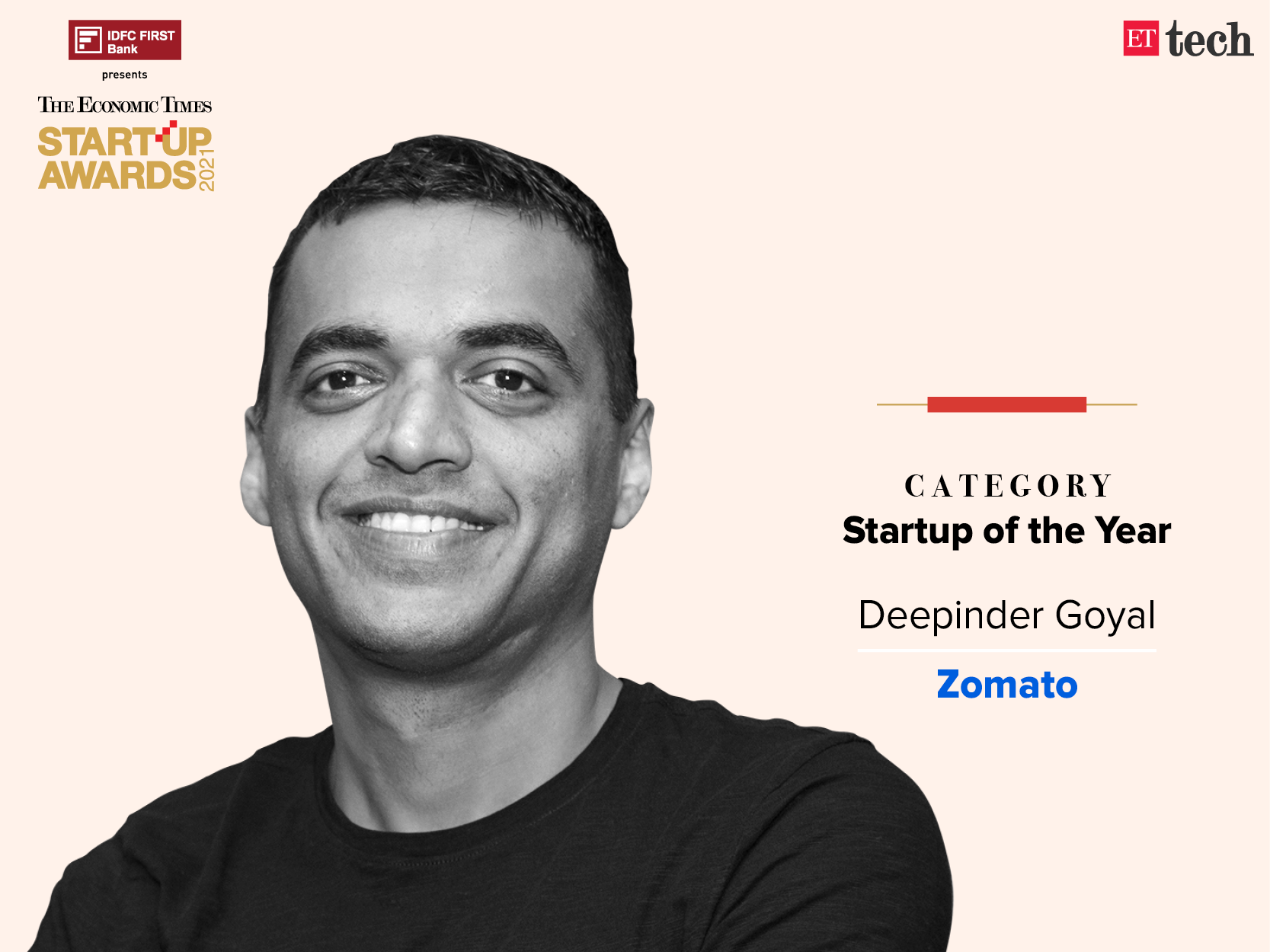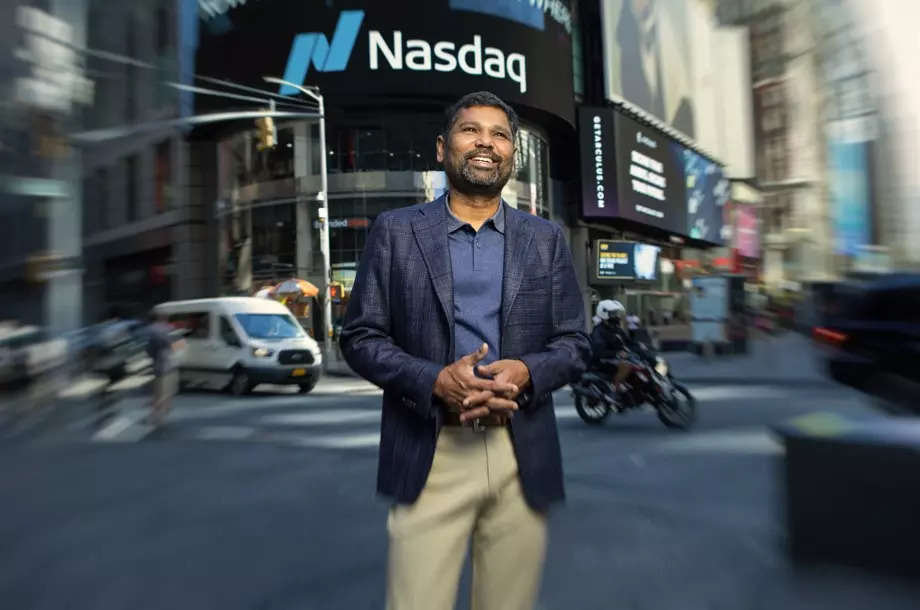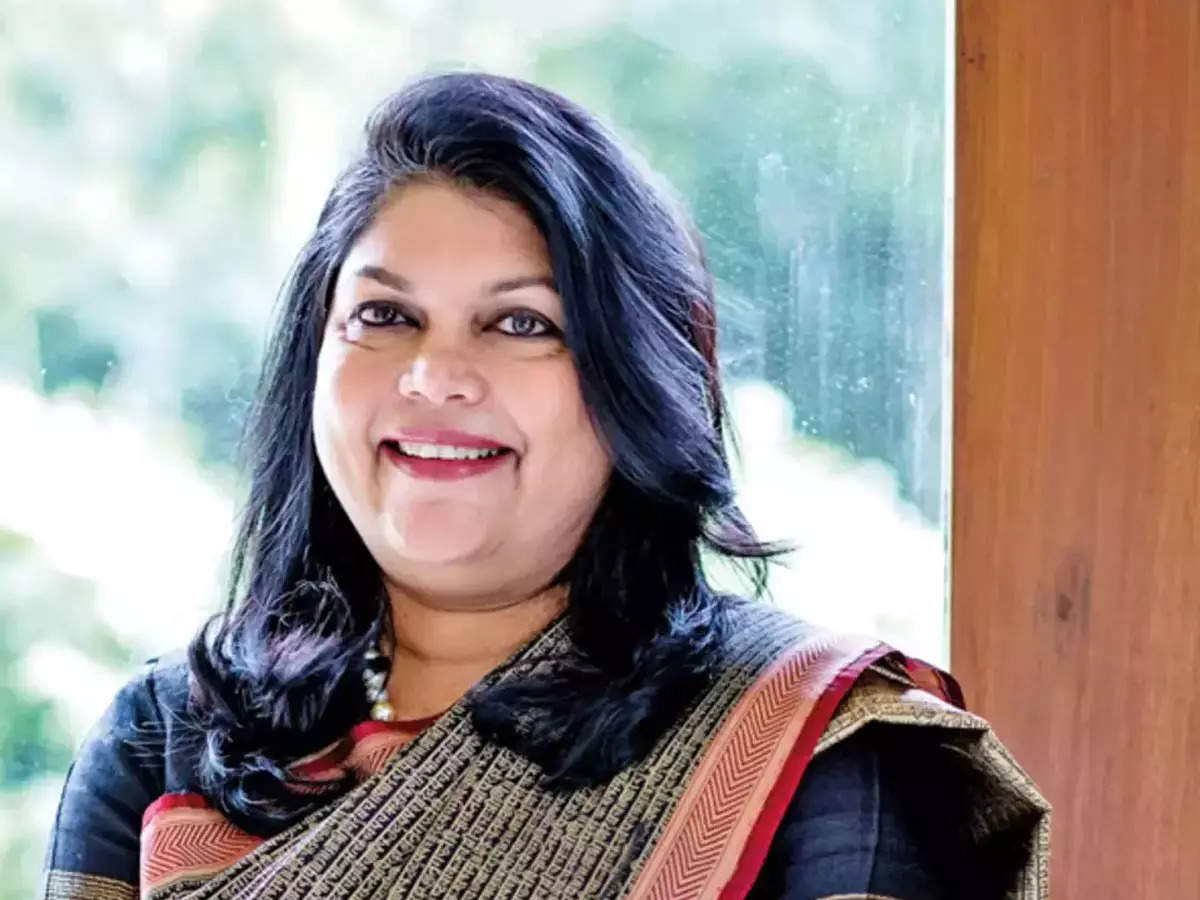ETSA 2021: And the winners are…
On Friday, our high-powered jury, comprising top Indian and global business leaders, investors and entrepreneurs, met virtually to decide which of these deserved to be called the best of the best.
Today, it’s our pleasure to announce the
This big-bang year belongs to
Zomato cofounder Deepinder Goyal
Zomato, which had a trailblazing IPO earlier this year, won top honours at the seventh edition of The Economic Times Startup Awards. Our high-powered jury, led by Infosys cofounder and non-executive chairman Nandan Nilekani, chose winners across nine categories from a shortlist of 44 contenders on Friday.
The winners included companies that aim to break new ground, demonstrate the ability to build large, scalable businesses, and have perseverance to tide over tough times — including a once-in-a century pandemic.
- “Zomato has broken the glass between the private and the public universe. These two have been parallel universes for a decade. The fact that somebody burst out of the private universe and had such a spectacular success on the consciousness of the public markets, that itself is an astonishingly mind-blowing achievement…,” Nilekani said.
With this, the Gurgaon-based company joins a list of eminent companies that have previously bagged the award: Ola, Freshworks, Swiggy, Oyo, Delhivery and Zerodha.
Role models: The decisive votes were cast for entrepreneurs that have shown a long-term outlook. The winners in categories such as Comeback Kid, Woman Ahead, and even Startup of the Year exemplified this quality, the jury said.

Select group: A select group of around 100 founders, investors and other stakeholders of the country’s startup ecosystem chose the initial pool of candidates for the awards. ET’s editors then worked with knowledge partner Tracxn to create the final shortlist, ensuring that the
Startup of the Year: Zomato

Online food delivery and restaurant platform Zomato was voted as The Economic Times Startup of the Year 2021 by a star-studded jury, just a few months after it went public, setting an example for others in the industry.
Zomato’s blockbuster listing not only received major institutional capital but stirred up massive interest among retail investors too.
But that doesn’t mean the jury’s decision was easy by any means. Edtech major Byju’s was discussed widely for its ambition to become a large global player in online education. But Zomato’s IPO, combined with its ability to survive and thrive in a hyper-competitive industry such as online food delivery, found favour with the jury.
“By building an amazing business in an extremely competitive market with incredibly tough unit economics, Zomato is a business that’s not just a leader in India but is respected globally,” said Gokul Rajaram, product and business leader, DoorDash.
Deepinder Goyal, cofounder and CEO at Zomato, who did not participate in the discussions and the voting as he was a jury member, said, “We didn’t think we would win this, as all the other nominees are great companies. We look up to some of them for a number of things. In that light, we are thankful and humbled for winning the prestigious Startup of the Year Award. We hope to continue living up to the honour in the years to come.”
Midas Touch for best investor: Sanjeev Bikhchandani

This year’s Midas Touch award for the best investor went to Sanjeev Bikhchandani, a veteran of the Indian internet industry.
The Info Edge cofounder was almost the unanimous choice of the jury for his contribution to Zomato’s success as its very first investor back in 2010.
His first cheque for Zomato was for Rs 4.7 crore in 2010. Today Info Edge’s 15.23% stake in the company is worth Rs 16,327 crore (at Friday’s closing price of Rs 136.65 per share on the BSE).
“Sanjeev has been around since the first tech boom and has been an inspiration to all of us. Now he’s inspiring us as an investor as well. His knack for picking companies to invest in, helping them and seeing them through the entire journey till they go public is what is exemplary,” said jury member Sachin Bansal, cofounder of Flipkart and founder and CEO of Navi Technologies.
Bikhchandani said that while it was a great honour to be adjudged the winner, the credit goes to the investment team of Info Edge and mostly to Zomato. “Though I’m the face of Info Edge, the truth is it’s the investment team, the other directors that have enabled us to stay on as investors… It’s a joint effort and most of the credit goes to the Zomato team,” he said.
Comeback Kid: Aloke Bajpai and Rajnish Kumar, cofounders, Ixigo

The jury was inspired by Aloke Bajpai and Rajnish Kumar’s decision to not change course in the face of several adversities, an attribute they said was the hallmark of a winner.
In the end, it was the grit and resilience of the founders of the 15-year-old travel booking website — which will go public soon — that swung it for them.
The two IIT Kanpur alumni were chosen after one of the longest discussions during the ETSA jury meeting. After the first round of voting, it was between the Ixigo founders and Manish Taneja of Purplle. Bajpai and Kumar won because, as the jury members highlighted, Ixigo not only survived the Covid-19 pandemic, it is slated to launch a Rs 1,600-crore (about $215 million) IPO soon.
“Ixigo has seen many cycles of not being the leader, being written off, having faced the Covid-19 disruption, but they persevered and are taking the company all the way to an IPO. That is impressive,” said jury member Amit Agarwal, global SVP and country head at Amazon India.
“It has been a roller coaster ride full of twists and turns. Despite being one of the least capitalised players in a hyper-competitive category, we never shied away from working on game changing product ideas. At many points in our journey, we ran out of money, but we never ran out of ideas to grow faster and take a bigger bet on ourselves,” Kumar said.
Woman Ahead: Lizzie Chapman

In the end, it all came down to Lizzie Chapman’s perseverance as she pipped Sugar Cosmetics chief executive Vineeta Singh to emerge as the winner in the Woman Ahead category.
Chapman’s journey in financial services goes back to 2011 when she was the India head of UK-based BNPL player Wonga. She founded ZestMoney in 2015 with former colleagues from Wonga, to make digital goods and services accessible to the masses. The company recently raised $50 million in its Series C funding round from global BNPL provider Zip Co Ltd.
“ZestMoney has built something unique which I personally haven’t seen anywhere else. Also, it’s scaled not just online, but also offline in partnership with point-of-sale. By essentially competing and winning in this competitive category, Chapman and ZestMoney deserve to get the award,” said jury member Gokul Rajaram, the product and business leader at US-based food delivery platform DoorDash.
“Almost 10 years ago, we saw that Indian consumers would love a product that had the lowest costs and was the easiest to use. We were probably a tiny bit too early, but the observations we had then — that BNPL (buy now, pay later) was going to be much-needed in the Indian ecosystem — has finally become very obvious,” Chapman said.
Top Innovator: Log 9 Materials

Log 9 Materials’ future potential to massively disrupt two sectors eventually led the jury members of ETSA to pick it as the winner in the Top Innovator category.
The race began with two favourites — Qure.ai, a healthcare startup which uses artificial intelligence to interpret radiology images, and Log 9 Materials, which is developing battery and fuel cell technologies.
Founded in 2015, Log 9 Materials started off as a material sciences company with expertise in manufacturing graphene and carbon nanomaterials, but pivoted to productise its own research and zeroed in on developing lithium-ion battery and aluminium fuel-cell technologies.
Best on Campus: FamPay

Two very different companies fought a close battle for the top honours in the Best on Campus category at the ETSA 2021.
The jury had to weigh the pros and cons carefully to decide between Pixxel, a startup building a constellation of earth imaging satellites, and FamPay, a provider of payments and financial services to teenagers.
After an animated discussion, the jury members picked FamPay as the top startup to emerge from a college campus in India.
FamPay’s product has gained traction during the Covid-19 pandemic as it enables teenagers to own a quasi-digital banking account where parents can deposit pocket money and other allowances.
Social Enterprise: Genrobotic Innovations

Using cutting-edge technology to overcome some of the most deep-rooted social issues, such as manual scavenging, helped Genrobotic Innovations emerge as the winner in the crucial Social Enterprise category.
While rural fintech and lending startup Jai Kisan was neck-and-neck with Genrobotic after the first round of voting, the Thiruvananthapuram-based startup pulled ahead as the jury discussed the novelty of the idea to use robots to replace manual scavenging.
“Genrobotic is bringing together technology, purpose and profitability, which is rare and extremely valuable,” said Ankiti Bose, cofounder and CEO of B2B ecommerce platform Zilingo, who was part of the jury.
Bootstrap Champ: Kovai.co

Kovai.co’s determination to build world-class software products out of a Tier-II city such as Coimbatore, rather than Bengaluru or Chennai, sealed the deal for the members of the jury.
The startup, which went head-to-head with fellow Chennai-born SaaS company Cardinality.ai, eventually ended up on the top of the jury’s list for Bootstrap Champ, for its financial heft and ability to inspire entrepreneurs to build global businesses from smaller cities and towns.
“It’s very hard to build a bootstrapped company at scale,” said Anu Hariharan, a jury member and partner at Y Combinator Continuity Fund. “They’ve done it in a very interesting format which I’ve never seen before — of having a presence in both London and Coimbatore, but largely having their engineering team in Coimbatore which helps them on the cost and R&D.”
Covid-led Business Transformation: Urban Company

The founders of Urban Company — Abhiraj Singh Bhal, Raghav Chandra and Varun Khaitan — were able to significantly grow a high-touch services business amid a raging pandemic, even as most offline counterparts were severely impacted.
The ETSA jury highlighted this aspect as the key quality of the Gurugram-based firm formerly known as UrbanClap.
“They completely transformed their business during Covid-19, using various safety protocols and staff vaccinations to turn a terrible pandemic into a business opportunity. They launched and scaled new categories such as Men’s Salon. Eventually, Urban Company personnel were one of the few ‘outside’ people entering our homes before anybody else,” said Zomato cofounder Deepinder Goyal, one of the jury members.
ETSA Alumni: Where are they now?
The previous winners of the ET Startup Awards (ETSA) have stood out in a crowded startup ecosystem and gone on to become successful businesses. We look at a few of them from previous editions of the awards.
Girish Mathrubootham & Shan Krishnasamy
Freshworks | Startup of the Year (2016)

Freshworks founder Girish Mathrubootham
Last week, Freshworks (previously Freshdesk) became the first Indian SaaS startup to list on the Nasdaq, raising over $1 billion in its IPO at a valuation of over $10 billion.
Falguni Nayar
Nykaa | Woman Ahead (2017)

Nykaa founder and CEO Falguni Nayar
Omni-channel beauty and personal care retailer Nykaa is planning to raise as much as Rs 4,000 crore at a valuation of over $4 billion in an IPO scheduled for later this year.
Srinath Ravichandran & Moin SPM
Agnikul Cosmos | Top Innovator (2020)

Srinath Ravichandran (right) and Moin SPM, cofounders, AgniKul
Earlier this month, space technology startup Agnikul signed an MoU with the Department of Space for the development and testing of its space launch vehicles.
( News Source :Except for the headline, this story has not been edited by Rashtra News staff and is published from a economictimes.indiatimes.com feed.)
Related searches :





